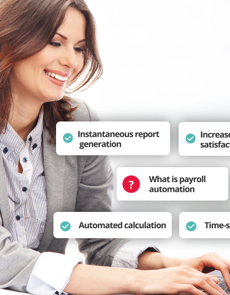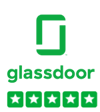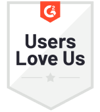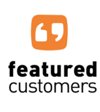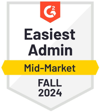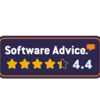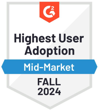How to Choose Payroll Software for Your SMB
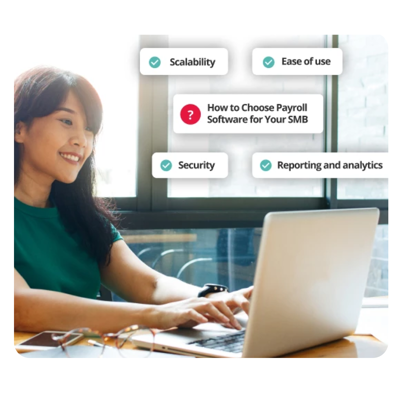
However, with so many systems available, the decision can be overwhelming. Understanding how to choose payroll software that meets your needs can help you to make the most out of your investment, resulting in a streamlined payroll process that will support your organisation both now and in the future.
Choosing a payroll system that is right for your business takes a little time and research, but can help to contribute to the overall success of the company. It’s important to look for a solution that supports how you pay your employees, including the payment methods and frequency of payroll processing, and that can integrate with your existing systems.
In this guide to choosing payroll software, we’ll advise you on the key features you should look out for, as well as sharing expert tips that will help you to decide which system is right for your business.
What to look out for when choosing payroll software
Let’s take a look at the most important features of payroll software. These considerations should be a deciding factor when choosing a payroll system that meets all of your business’ needs.
1. Reporting and analytics
Effective payroll software should have comprehensive reporting and analytics capabilities, making it quicker and easier for you to review important data at a glance. This will help you to make informed decisions about tax obligations, budgeting, compliance and employee benefits.
Detailed reports help ensure accurate payroll calculations, reducing the risk of errors that can lead to regulatory issues or employee dissatisfaction. Automated analytics functions can also identify trends and anomalies in payroll data, enabling better strategic planning and resource allocation.
2. Scalability
Scalability is a crucial consideration when choosing payroll software, but may be overlooked by small and medium-sized businesses. Rather than just focus on reducing costs by opting for the simplest system that will work for right now, it’s important to invest in one that’s capable of supporting you in the long term.
As your business grows, so will the number of employees and the complexity of payroll processes. Without a scalable solution, you could soon find yourself facing costly and time-consuming migrations to new software. Whether you're adding new employees, expanding to new locations or adding functionalities, scalable payroll software can adapt to your changing business needs.
3. Security
As it’s used to process sensitive personal and financial information, your chosen payroll software must be secure and reliable to protect against fraud and data breaches. Any payroll system that you consider should offer robust security measures, including multi-factor authentication, password protection and data encryption.
These features safeguard information stored about your business and employees, ensure that only authorised personnel have access, and keep data secure during storage and transmission. Strong security protocols not only protect your business but also build trust with your employees, and support your compliance with UK laws.
4. Ease of use
One of the key benefits of payroll software is its ability to simplify the entire process, giving your payroll team more time to focus on other strategic business tasks. Choosing a payroll system that’s easy to use is therefore essential to optimise efficiency. This also reduces the learning curve, speeding up your return on investment, and minimises the risk of payroll processing errors.
Take advantage of free trials and product demonstrations to ensure that the interface is user friendly and includes clear instructions and customer support for getting set up. In particular, gauge how easy the employee portal is to use, as complex systems can cause frustration, errors and dissatisfaction. This is particularly important if employees are required to interact with them on a regular basis, such as for inputting weekly timesheets.
5. Mobile access
Mobile accessibility might not be a priority for all SMBs, but it can be a huge benefit for small, on-the-go businesses and those operating from a number of different job sites. With cloud-based mobile access, you can manage payroll functions from anywhere, ensuring that all data and compliance requirements are synchronised and up to date.
This flexibility makes it easier for payroll teams to promptly respond to any issues that arise, increasing productivity and employee satisfaction. It also helps employees who may be travelling or working at a remote job site to conveniently input timesheets, download payslips and manage their annual leave.
6. Customer support
While it’s important to make the most of your budget, choosing payroll software based purely on which one costs the least can end up costing you more in the long run. This is because they tend not to offer comprehensive customer support. Reliable customer support can help you to quickly resolve problems, minimising disruptions to your payroll processes so you can make sure your employees are paid correctly and on time.
Look for payroll software providers that provide various support channels, such as phone, email and live chat, along with resources like FAQs, troubleshooting guides and tutorials to help you resolve issues on your own. Many providers offer tiered add-on plans, allowing you to tailor the level of support to your business needs and budget.
7. Time tracking
Accurately logging the hours worked by each employee is essential for calculating pay, managing overtime and ensuring compliance with labour laws. An important feature to look out for in your chosen payroll software is time tracking functionality, which simplifies the payroll process by automatically importing timesheets.
Time tracking features are particularly useful for businesses with hourly employees, providing an efficient and reliable way to record hours worked. This helps to reduce manual data entry and minimise errors, ultimately improving payroll accuracy and efficiency.
The key features of payroll software
Now let’s look at the key features of payroll software that signal effectiveness and reliability. Like any system, there are some disadvantages of payroll software that you’ll need to consider when choosing a payroll system for your business. By weighing these up against the key features and functionality that you need, you can make an informed decision that will offer the most effective support for your business and its employees.
1. Employee self-service
Effective payroll software should allow employees to log in and perform key functions such as accessing their payslips, updating their personal details and managing their tax information. This self-service functionality not only empowers employees but also reduces the administrative burden on HR and payroll departments by allowing employees to handle routine tasks on their own.
2. The ability to integrate with other systems
It’s important to choose payroll software that can integrate with other systems used across the business, such as accounting and HR systems. This connectivity ensures seamless data flow, reducing manual data entry and errors for efficient, accurate payroll processing. It also makes it easier for business owners and employees to access consistent information across all platforms and departments.
3. Direct Debit
Payroll systems should offer the ability to directly transfer employees’ salaries into their bank accounts. The majority of employees prefer this method of payment because it’s convenient and secure, so this is a must-have feature for businesses of all sizes. Direct Debit enhances employee satisfaction by automating payments to ensure timely, accurate processing.
4. Effective tax management
When choosing payroll software, look for one that includes tax management and filing features. These capabilities help to avoid miscalculations and ensure that the right tax forms are filed with the appropriate government bodies. Effective tax management features save time and reduce the risk of costly errors or penalties by failing to comply with relevant payroll legislation.
Choosing a payroll system for your business
Now we’ve explored how to choose payroll software in detail, you should be better equipped to make a decision that will support your business both now and in the future.
As well as offering basic payroll functionality, the most effective payroll systems also offer cross-platform integration, convenient employee self-serve portals, and features to support accurate tax filing. By ensuring that the solution you implement is scalable, secure and backed by excellent customer support, you can streamline business processes, and increase productivity, helping you to save time and money.
Choosing payroll software from PeopleHR is ideal for SMBs looking for a secure, reliable solution that will ensure that your employees are paid on time, every time. Download our brochure to find out more about our payroll solutions.

Related resources
We are trusted by experts


